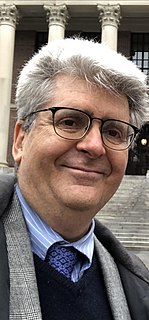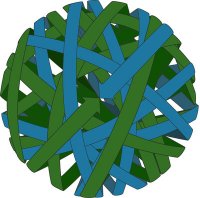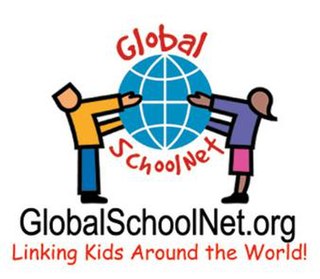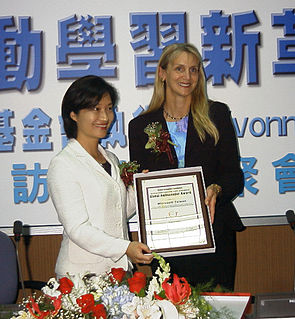
The University for Peace (UPEACE) is an intergovernmental organization with university status, established by treaty at the United Nations General Assembly in 1980 and having its main campus in Costa Rica. Its stated mission is "to provide humanity with an international institution of higher education for peace with the aim of promoting among all human beings the spirit of understanding, tolerance and peaceful coexistence, to stimulate cooperation among peoples and to help lessen obstacles and threats to world peace and progress, in keeping with the noble aspirations proclaimed in the Charter of the United Nations."
The Reggio Emilia approach is an educational philosophy and pedagogy focused on preschool and primary education. This approach is a student-centered and constructivist self-guided curriculum that uses self-directed, experiential learning in relationship-driven environments. The programme is based on the principles of respect, responsibility and community through exploration, discovery and play.

The School of International Service (SIS) is American University's school of advanced international study, covering areas such as international politics, international communication, international development, international economics, peace and conflict resolution, global environmental politics, and U.S. foreign policy.
Peace education is the process of acquiring the values, the knowledge and developing the attitudes, skills, and behaviors to live in harmony with oneself, with others, and with the natural environment.

Fernando M. Reimers is the Ford Foundation Professor of the Practice in International Education and Director of the Global Education Innovation Initiative and of The International Education Policy Program at Harvard University. He is interested in advancing understanding of the ways schools can empower students to participate civically and economically, and to help achieve the UN Sustainable Development Goals. He is a member of UNESCO's Commission on the Futures of Education and is interested in supporting the creation of coalitions that collaborate in enhancing the relevancy of educational institutions and to strengthen the teaching profession.

International Polytechnic High School, commonly abbreviated merely as iPoly, is a public college-preparatory demonstration high school (9-12) located on the California State Polytechnic University, Pomona campus and operated by the Los Angeles County Office of Education (LACOE) in conjunction with the College of Education and Integrative Studies at the university. iPoly's curriculum is fully accredited by the Western Association of Schools and Colleges and is approved by the University of California and California State University. It maintains a unique affiliation with the Los Angeles County High School for the Arts (LACHSA), which is also run by LACOE. Since iPoly does not lie in a fixed school district, it draws students from throughout Los Angeles, San Bernardino, Orange and Riverside counties. The majority of students come from the Pomona and San Gabriel valleys. In 2009 and 2013, iPoly was honored as a California Distinguished School by the California Department of Education.

The British School of Guangzhou is a British international school in Baiyun District, Guangzhou, China. The school caters to students from the ages of 1 to 18.
The Association for Supervision and Curriculum Development d/b/a ASCD is a membership-based non-profit organization founded in 1943. It has more than 125,000 members from more than 128 countries, including superintendents, principals, teachers, professors of education, and other educators. The ASCD Community also includes 52 affiliate organizations, self-organized Connected Communities, and ASCD Student Chapters. While ASCD was initially founded with a focus on curriculum and supervision, the association now provides its members with professional development, educational leadership, and capacity building. ASCD is a global community advancing student achievement by supporting the whole child, and seeks to develop programs, products, and services essential to the way educators learn, teach, and lead.

University of the Middle East Project (UME) is an independent non-governmental organization whose people-to-people exchange programs bring together secondary school educators from across the Middle East and North Africa (MENA) and the United States with the aim of enhancing pedagogical skills and encouraging cross-cultural dialogue and understanding. In the United States, UME is a 501(c)(3) not-for-profit organization, registered as The Center for Higher Education in the Middle East, Inc.

Compass International School Doha is a private, co-educational school in Doha, Qatar. It is an International School with campuses located in Gharaffa, Madinat Khalifa, Rayyan and a new campus opening in September 2019 in Themaid. It was founded in 2006 by Fieldwork Education and the school is part of the Nord Anglia group of schools.
The Center for Homeland Defense and Security at the Naval Postgraduate School (NPS) in Monterey, California is a school focusing on homeland security education.

One World Youth Project (OWYP) is a non-profit 501(c)(3) corporation founded in Massachusetts and currently based in Washington DC. The goal of One World Youth Project is to enhance education towards a more discerning, empathetic and empowered generation of global citizens. In 2009, One World Youth Project launched the One World Hub program, a service-learning program that trains university students to lead a global education curriculum in local middle/high schools, and to connect these secondary school classrooms with partner classrooms in other countries. The One World Youth Project global education curriculum includes the following units: cultural exchange, understanding of global challenges, community mapping, and service-learning.

Global SchoolNet (GSN) is a nonprofit 501(c)3 international educational organization that serves as a clearinghouse for collaborative educational projects, many that are based on the Constructivist Learning model. The organization coordinates projects and competitions focused on humanitarian issues, diplomacy, leadership, innovative teaching, entrepreneurship, STEM, and other academics for schools and youth organizations internationally. About 150,000 educators from 194 countries have registered as members of Global SchoolNet, and about 5.5 million students from 109 countries have participated in GSN projects as of 2020. Global SchoolNet is known for two international competitions, the International CyberFair for students in grades kindergarten through high school, and the U.S. State Department-sponsored Doors to Diplomacy for ages 12 through 19. Global SchoolNet was established in 1984 as Free Educational Mail (FrEdMail) in San Diego, California, where its headquarters still exists.

Dr. Yvonne Marie Andrés is an American educator who is recognized as an e-learning pioneer and visionary. Andrés is the co-founder of the non-profit Global SchoolNet (1984) and the founder of the Global Schoolhouse (1992). Andrés was named one of the 25 most influential people worldwide in education technology and was invited to meet with President Bush to launch the Friendship Through Education initiative (2000). Andrés is the creator and producer of International CyberFair and the US State Department’s Doors to Diplomacy program. Andrés frequently writes about highly effective education programs from around the globe that blend online and offline learning, while incorporating the latest neuroplasticity findings and Constructivist Learning methodology. Andrés has provided leadership throughout the US, Canada, Asia, Europe, Australia, South America and Africa and in 2007 Andrés was awarded the Soroptimist International Making a Difference Award for advancing the status of women and children. In August 2012 Andrés was selected as one of San Diego Magazine's Women Who Move the City, recognizing dynamic women who create positive change and contribute to the community.
Global education is a mental development program that seeks to improve global human development based on the understanding of global dynamics, through the various sectors of human development delivery. In formal education, as a mode of human development delivery, it is integrated into formal educational programs, as an advanced program where global dimensions to local problems are appreciated through interconnectivity. Its first phase began as an undertaking to restructure education and society in the 1960s and 1970s, through the initiatives of educationalists, NGOs and intergovernmental organizations. The program evolves with the internet, and is in its virtual interconnectivity phase, through social media and other global public spheres. This global approach to mental development, seeks to fix the failing curriculum-based global education program that is: stuck in limited subject knowledge, based on theories that have failed the world ;hinged on memorization without visual exposure to knowledge development resources and global culture, limited by access to human development resources. Instead, the program seeks to improve the global mental resources pool through the appreciation of global dynamics and local perspectives on issues. This is through alternative motivations for global human development, and alternative global futures hinged on interconnectivity.
The Partnership for Peace Consortium is a network of over 800 defense academies and security studies institutes across 60 countries. Founded in 1998 during the NATO Summit, the PfPC was chartered to promote defense institution building and foster regional stability through multinational education and research, which the PfPC accomplishes via a network of educators and researchers. It is based at the George C. Marshall European Center for Security Studies in Garmisch, Germany. According to the PfPC Annual Report of 2012, in 2012 eight hundred defense academies and security studies institutes in 59 countries worked with the PfPC in 69 defense education/defense institution building and policy-relevant events. The Consortium publishes an academic quarterly journal CONNECTIONS in English and Russian. The journal is run by an international Editorial Board of experts and is distributed to over 1,000 institutions in 54 countries.
Global citizenship education (GCED) is a form of civic learning that involves students' active participation in projects that address global issues of a social, political, economic, or environmental nature. The two main elements of GCE are 'global consciousness'; the moral or ethical aspect of global issues, and 'global competencies', or skills meant to enable learners to participate in changing and developing the world. The promotion of GCE was a response by governments and NGOs to the emergence of supranational institution, regional economic blocs, and the development of information and communications technologies. These have all resulted in the emergence of a more globally oriented and collaborative approach to education. GCE addresses themes such as peace and human rights, intercultural understanding, citizenship education, respect for diversity and tolerance, and inclusiveness.
Stonyhurst Southville International School is a learning institution in the province of Batangas and one of the SGEN schools with the aim of making genuine quality international education accessible to the people of the Batangas Province and the Calabarzon region.

The British International School of Chicago, South Loop is a private international school located in the South Loop area of Chicago. BISC-SL offers education for ages 3 to 18. One in three Nord Anglia graduates in 2015 was accepted to one of the top 100 universities in the world as ranked by the QS World University Rankings.
Education for justice is the process of promoting a culture of lawfulness through educational activities at all levels. Education for justice aims at teaching the next generation about crime prevention, and to better understand and address problems that can undermine the rule of law. It promotes peace and encourages students to actively engage in their communities and future professions. Education for Justice is a basic legal knowledge, in which educational activities at all levels seek to promote understanding of crime prevention, peace, justice, human rights, and problems that can undermine the rule of law. Education reportedly plays a key role in transmitting and sustaining socio-cultural norms and ensuring their continued evolution. As such, governments may seek to strengthen this promotion of a culture of lawfulness through education.











